THe Countrey Parson, if there be any of his parish that hold strange Doctrins, useth all possible diligence to reduce them to the common Faith. The first means he useth is Prayer, beseeching the Father of lights to open their eyes, and to give him power so to fit his discourse to them, that it may effectually pierce their hearts, and convert them. The second means is a very loving, and sweet usage of them, both in going to, and sending for them often, and in finding out Courtesies to place on them; as in their tithes, or otherwise. The third means is the observation what is the main foundation, and pillar of their cause, whereon they rely; as if he be a Papist, the Church is the hinge he turnes on; if a Schismatick, scandall. Wherefore the Parson hath diligently examined these two with himselfe, as what the Church is, how it began, how it proceeded, whether it be a rule to it selfe, whether it hath a rule, whether having a rule, it ought not to be guided by it; whether any rule in the world be obscure, and how then should the best be so, at least in fundamentall things, the obscurity in some points being the exercise of the Church, the light in the foundations being the guide; The Church needing both an evidence, and an exercise. So for Scandall: what scandall is, when given or taken; whether, there being two precepts, one of obeying Authority, the other of not giving scandall, that ought not to be preferred, especially since in disobeying there is scandall also: whether things once indifferent, being made by the precept of Authority more then indifferent, it be in our power to omit or refuse them. These and the like points hee hath accurately digested, having ever besides two great helps and powerfull perswaders on his side; the one, a strict religious life; the other an humble, and ingenuous search of truth; being unmoved in arguing, and voyd of all contentiousnesse: which are two great lights able to dazle the eyes of the misled, while they consider, that God cannot be wanting to them in Doctrine, to whom he is so gracious in Life.
Herbert here is advising ministers how to deal with erroneous doctrine in the church. When I first saw the title I was expecting a chapter on church conflict, but by arguing he means rationally debating and convincing parishioners of his point. Herbert deals with the debates of his day, centered on the nature of the Church, but his advice would do well for dealing with any wrong beliefs.
1. Pray for the parishioner. The work of the Holy Spirit is ultimately what convinces of truth, not our cleverness.
2. Don’t cut yourself off from them but instead show them love and spend time with them. It can be difficult, but I wonder how many transformations could have been made in people’s lives through persistent, even stubborn love. (I had a friend in our youth group who had been influenced by someone at work, when he brought these questions and concerns to our minister he was told if he believed like that he could go to the church down the road. That friend is no longer in church. I wonder how it would have been if the pastor would have taken a little extra time with him and explained his beliefs and showed some extra attention.)
3. Find the root of the difficulty and deal with it. So often the issue that is brought to us is more of a ‘symptom’ of a deeper and more fundamental problem or misunderstanding. A common issue I face is with the question of infant baptism. Often times when people have questions over the validity of infant baptism, when I discuss it with them I find that the concern is that in baptizing babies they worry that we are proclaiming that infants are guaranteed salvation because of the sacrament. (Of course this isn’t the issue with everyone.) Often the real difficulty is not with the sacrament but with the need for repentance and faith is salvation. Once the root is found the real issue can be dealt with more fruitfully.
Herbert offers good advice for pastorally dealing with error in the church. Of course it assumes that there is Truth and that therefore error is possible. I believe, from Herbert’s examples, that he would also make a distinction between errors that need confrontation, and those of lesser importance. Not everything is fundamental or even disruptive. A good pastor must know truth from error and also be able to distinguish fundamental dogma from mere opinions.
(Picture by McMorr)

I also appreciate the fact that Herbert emphasizes the importance of the pastor’s life and witness in these situations. Paul makes the statement, “Follow my example as I follow the example of Christ.” What I find, particularly in the rural church where everybody knows everything about everyone else, including the pastor; how the pastor lives will have more impact on the congregation than any of the teaching/preaching that he or she will do.
Love your new “format” though I must say the moment you begin to mention computer stuff, you’ve lost me. I would be interested in PDA/Smartphone types of things that I would use “on the road.” Do you use these and if so, how?
Thanks.